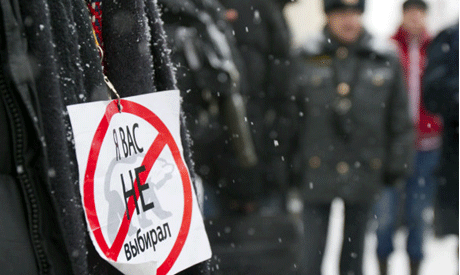
Protester with a sign reading: I did not elect you, outside the State Duma, after elections, in downtown Moscow, Russia, Wednesday (Photo: AP)
President Dmitry Medvedev on Thursday is expected to vow a revamped reform drive in Russia after protests rattled the authorities, in his final annual address to the nation as head of state.
Medvedev will at 0800 GMT address the Federal Assembly made up of both houses of parliament, a speech he is making for the last time after agreeing to cede the Kremlin to his mentor Vladimir Putin in March 2012 elections.
"I am going to present my vision of the future of Russia's political system and I am not just going to set it out, I am going to make concrete steps," Medvedev said last week of the address.
Media reports said the Kremlin had to substantially revise the text after 4 December parliamentary elections that showed an unexpectedly sharp dip in support for the ruling party and were followed by mass protests against vote-rigging.
In the first version drafted in November, Medvedev was due to make a summary of his achievements as president and outline economic reforms that the government would make in the next half decade, the Vedomosti daily said.
But after the parliamentary elections, it was decided to make political reform the main theme.
The keynote speech comes after tens of thousands of people took to the streets a week after the elections to protest the conduct of the polls, in the biggest show of popular discontent in Russia since the turbulent 1990s.
Almost 40,000 people have vowed on Facebook to attend a new protest in Moscow on Saturday which the authorities have allowed to go ahead but will watch nervously for any signs the protest wave is intensifying.
In a move to acknowledge the demands for greater democracy in Russia, the Interfax news agency said Medvedev could announce the return of elections for Russia's regional governors which were abolished by Putin in 2004.
The reform—first mooted by Putin himself last week—would see regional parliaments propose candidates who would then be vetted by the Kremlin before being put before the people in direct elections.
Putin—Russia's strongman since the resignation of Boris Yeltsin 12 years ago—served two terms as president until 2008 but then became prime minister in a tandem arrangement with Medvedev in which he was always the senior partner.
Medvedev is due to become prime minister under a Putin presidency from 2012, a job swap bitterly criticised by the opposition for determining Russia's medium-term political future behind closed doors.
A pro-reform think tank said Thursday that Russia's political system had become increasingly divorced from the social reality in the country while its leaders had little idea how to respond.
"Russian society does not just want to know its future but to have a say on where the authorities want to take it," the directors of the Institute of Contemporary Development (INSOR) said.
"The problem of the authorities is that they did not want to hear or feel this," they said in an article for the Nezavisimaya Gazeta.
Medvedev came to power amid hopes that he would implement real change in Russia, and in his Federal Assembly address in November 2009 promised a programme of historic modernisation of the country's economy and political system.
But his most liberal backers lament that he never realised these aspirations and accuse him of meekly surrendering power to Putin after a presidency long on rhetoric but short on action.
On Thursday, Medvedev further slammed attempts by "extremists" to manipulate Russians and warned against foreign interference, after a wave of protests against the conduct of elections.
"Attemps to manipulate Russian citizens and lead them astray are unacceptable. We will not allow provocateurs and extremists to drag society into their schemes," he said in an address to the nation. He added: "We will not allow interference from outside in our internal affairs."
Short link: